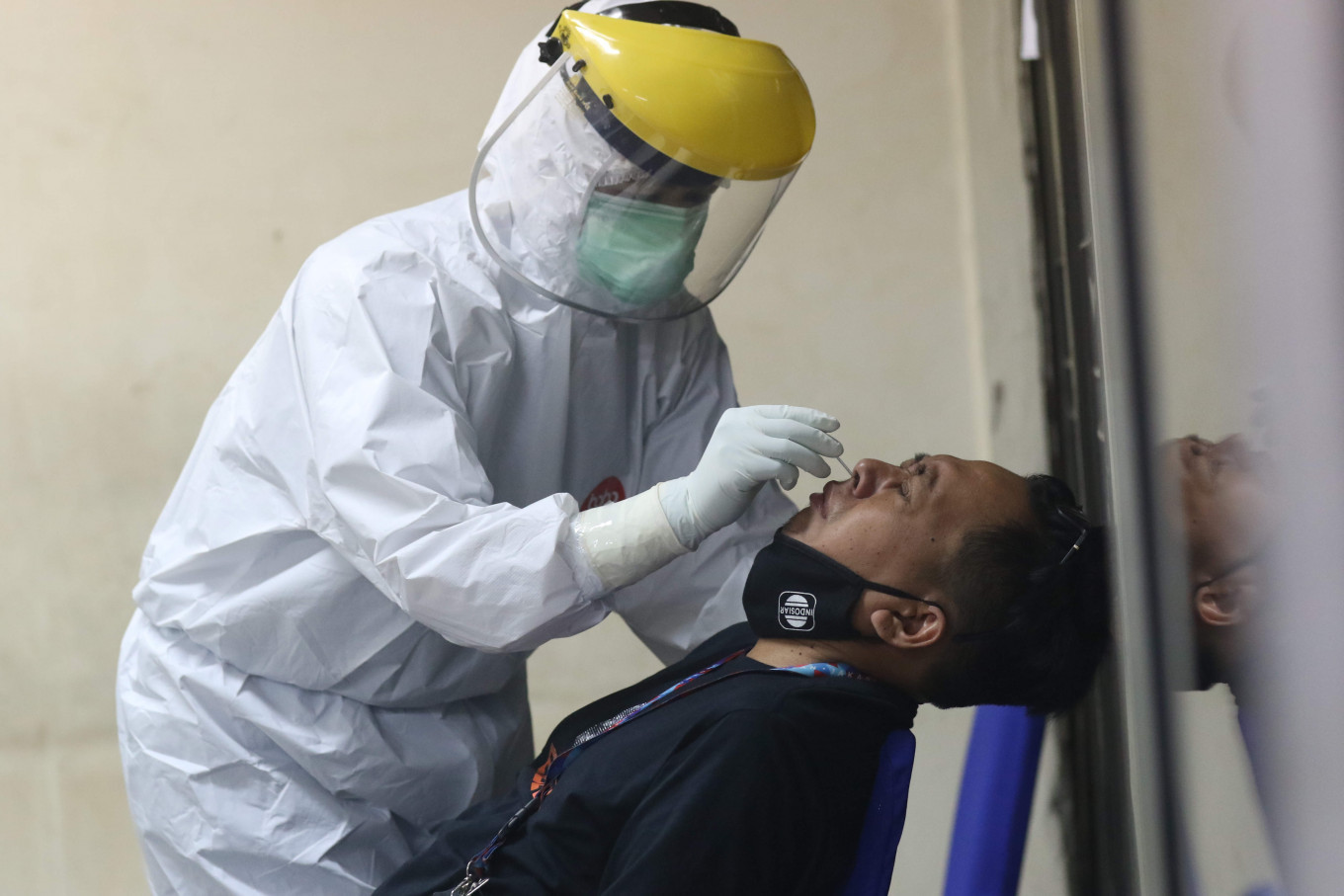Popular Reads
Top Results
Can't find what you're looking for?
View all search resultsPopular Reads
Top Results
Can't find what you're looking for?
View all search resultsMasculinity hinders COVID-19 prevention measures
COVID-19, like some other diseases, is highly gendered and a gender-aspect matter. Men's engagement in risky behavior, such as smoking and alcohol consumption, perhaps make them more susceptible to severe COVID-19 symptoms, according to Health Ministry.
Change text size
Gift Premium Articles
to Anyone
L
ike many other diseases, COVID-19 affects people differently. Some people or groups of people are more susceptible to SARS-CoV-2, the virus that causes COVID-19, develop more severe symptoms or die prematurely due to or related to the disease.
In contrast, other individuals or groups of individuals are more resilient or capable to protect themselves (and others) from transmission, such as by employing more consistent safety behavior or prevention measures. Washing one’s hands with soap, keeping a physical distance from others, wearing a face mask or seeking health care promptly when experiencing COVID-19 symptoms are examples of those preventative measures.
Of course, there are various biomedical or socioeconomic and cultural factors that underlie the different levels of people's vulnerability or resilience to COVID-19, but gender norms, particularly the concepts of masculinity, are among those important and frequently overlooked factors.
Data from many countries, including Indonesia, show that men are slightly more likely to contract SARS-CoV-2, less likely to seek medical care for the disease and far more likely to die as a result of COVID-19 than women.
In addition, a few studies have found that a component of masculine belief systems predicts lower levels of awareness about the threat of new coronavirus, lower levels of adherence to precautionary behavior or preventative measures, lower levels of support for state and local COVID-19 policies and therefore higher levels of COVID-19 sickness and deaths.
Official data in Indonesia has shown that the COVID-19 outbreak has taken a greater toll on male than on female Indonesians, with twice as many men testing positive for the disease. Men make up approximately 59 percent of the nationwide COVID-19 cases. Moreover, the Health Ministry revealed that men between 18 and 65 years of age make up the highest number of COVID-19 cases.
The ministry claimed this was mainly caused by the relatively high mobility in this age group as well as other socioeconomic factors. According to the ministry, men's engagement in risky behavior, such as a higher rate of smoking and alcohol consumption, perhaps also contribute to male vulnerability to severe COVID-19 symptoms and a higher fatality rate.
A recent survey by the Statistics Indonesia (BPS) demonstrates a lower level of compliance with COVID-19 protective behavior among men than women. For instances, only 88.5 percent of male respondents strongly adhere to wearing a mask, which compares to 94.8 percent among the opposite gender. Only 69.5 percent of male respondents comply with 20-second handwashing compared to 80.1 percent among their female counterparts. The survey also showed that men lag behind in maintaining physical distancing (only 68.7 percent as against 77.5 percent for women).
The data tell us that COVID-19, like some other diseases, is highly gendered and a gender-aspect matter. Traditional and dominant gender values that idealize men as tough, self-reliant and independent and women as dependent or weak on the end put men and women's lives in greater harm and influence people's responses to danger. These traditional concepts of gender norms and unhealthy masculinity play a key role in impeding the awareness and capabilities of numerous men to be more responsive to harms and employ safer and precautionary action to maintain their health and wellbeing.
These norms hinder men's adherence to and daily application of key preventative behavior related to COVID-19, such as physical distancing or wearing a face mask, because these actions are considered unmanly, feminine or weak.
In addition, several studies emphasized the role of highly masculine leaders that worsen the pandemic in their countries and further decrease the motivation and capacity of many young men to display protective behavior. As we know, these leaders frequently mock the importance of prevention measures, such as wearing face masks, and often downplay the risk of COVID-19 in their country.
Their denial, unsupportive and toxic attitudes play key role in exacerbating COVID-19 in the US, Brazil and the Philippines. To a lower extent, such denial and macho attitude was also showed by some Indonesian key leaders at the national and local levels that partly contribute to our weak response to COVID-19.
Creative messages that deconstruct traditional gender norms and masculinity concepts as well as promoting healthier concepts of masculinity should be prioritized. US House of Representatives speaker Nancy Pelosi for example frequently said that "real men wear masks". US presidential candidate Joe Biden, who regularly puts on a mask in his campaign, also said recently that "wearing a mask is patriotic". These are examples of bringing masculinity concepts in line with constructive health messages.
Indeed, COVID-19-related health promotion activities organized by government and nongovernment institutions in any country, including Indonesia, should take these gender dimensions into account when they design and implement health education to address the pandemic.
Both men and women share the burden and responsibility and are capable of protecting themselves and others from SARS-CoV-2 and getting COVID-19 under control.
-- Senior lecturer and researcher at the School of Public Health, Hasanuddin University, Makassar, and member of the Indonesian Young Academy of Sciences (ALMI)









